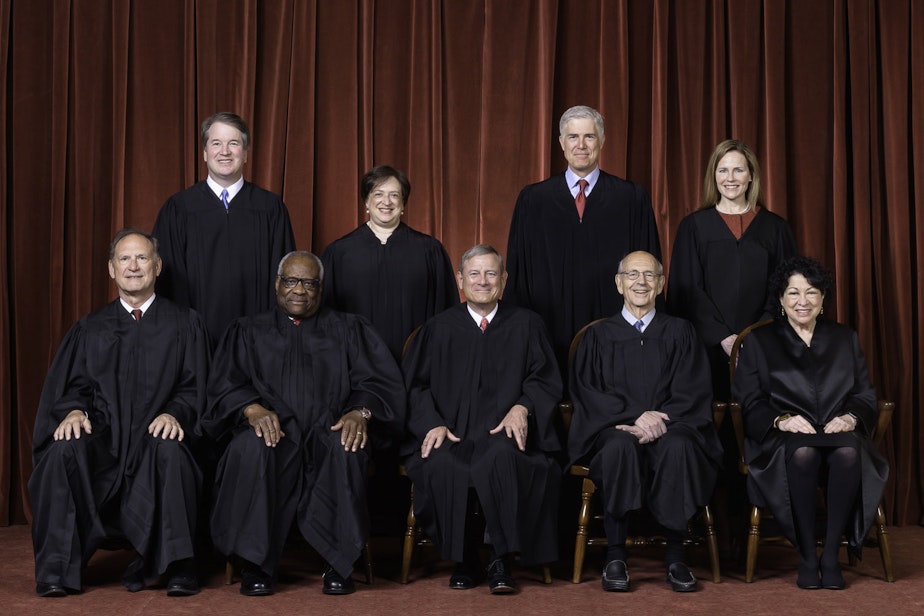Does SCOTUS ruling on public school prayer cross the line dividing church and state?

Among the many decisions from the U.S. Supreme Court this week was a ruling in favor of former Bremerton football coach Joseph Kennedy. Coach Kennedy sued the district after school officials objected to his practice of praying at the 50 yard line after football games. After Kennedy's contract ended, he did not apply for it to be renewed in 2016 and instead filed a lawsuit claiming the school district had discriminated against him.
KUOW’s David Hyde has been reporting on the case this week. He reviewed what he learned with Kim Malcolm.
This interview has been edited for clarity.
Kim Malcolm: Remind us what Kennedy did that led to him losing his job and getting to this court case.
David Hyde: In 2008, Joseph Kennedy becomes assistant football coach at Bremerton High School, but he's also an evangelical Christian. Part of what being an evangelical means is you're supposed to spread the Gospel. Kennedy decides to do something that we often see pro athletes do after football games, which is praying. But he doesn't do this silently to himself. He's praying right there on the 50-yard line in a very public way, and often with players from his own team or even other teams. Kennedy reportedly never asked them to join in. They actually asked if they could join him in prayer.
What did the school do in response?
They said, wait, you can't do that, there's the separation of church and state, your actions are coercive. They actually received some complaints from parents, about kids who felt like they were being forced to participate in this prayer, worrying that, this guy is the coach, he gets to decide whether or not I get to play. So the district tells him to cut it out. He keeps praying on the 50-yard line, although somewhat less publicly, and in the end, his contract wasn't renewed.
Sponsored
How did the coach defend himself?
He says his right to pray is protected under the First Amendment to the Constitution. I got a chance to speak with him on the day of the ruling. He said:
“This is an absolute great day for all Americans of every faith or no faith. Our freedoms are being very well represented right here.”
The First Amendment protects speech, but also religion. The state is not allowed to restrict people's religious practices. This is what his legal team argues in the case. But remember, the state is not allowed to favor one religion over others. That was important to the founders as well.
You interviewed a clergy member in Bremerton about the decision, Reverend Kathleen Kingslight. How did she react?
Sponsored
She leads St. Paul's Episcopal Church in Bremerton. Although she's a strong proponent of prayer, she called the Supreme Court ruling an attack on religious freedom: “This is a Navy town. We have kids that have come with their families. We've got Sikhs, and Muslims, and Jews, and Christians of all brands and stripes. You cannot pray one prayer and have it fit all. It doesn't work.”
She told me that she personally knows kids who felt like they were being coerced into praying by this coach, some of whom weren't really religious. She felt like this ruling by the Supreme Court was an attack on religious freedom, not just to people that don't practice religion, but people of other faiths, including other Christian players who felt coerced into praying with this evangelical Christian coach.
Do we have an inkling yet how this decision could affect wider issues around prayer in public schools and the separation of church and state?
That's a really good question. I'm not a legal expert. Based on what I've been reading, it's not entirely clear. The majority in this case ruled that this coach should be allowed to engage in what Justice Gorsuch called short, private, personal prayer, but that was already allowed. Many people say that's a really weird way to describe what Coach Kennedy is actually doing here on the 50-yard line, often surrounded by players. It doesn't seem so private or personal. But it seems likely that at a minimum, this ruling is going to lead to more people in schools engaging in similar acts of prayer, and we're also probably going to see more court cases.
What happens to Kennedy now? Is he going to get his job back at Bremerton High?
Sponsored
He told me he is waiting for the call from Bremerton about getting his job back. His legal team says that's exactly what the Supreme Court has ruled in this case. I did reach out to the district, but so far I haven't heard back.
Listen to the interview by clicking the play button above.
EDITOR'S NOTE: An earlier version of this story incorrectly said Kennedy had "lost his job" as an assistant football coach with Bremerton High School. Kennedy was contracted by the district. When his contract ended, he did not apply for it to be renewed.





